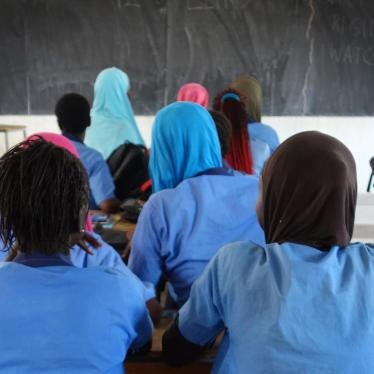Revelations that the Tallahassee Police Department may have failed to adequately investigate rape complaints, including one against a Florida State football star, unfortunately come as no surprise. Even when the suspect is not a local hero, police throughout the country too often fail to pursue cases that do not fit outdated stereotypes of “real” rape, particularly if the victim has been drinking.
Last year, Human Rights Watch revealed that, in the District of Columbia, the Metropolitan Police Department mishandled hundreds of sexual assault complaints. A 2011 Department of Justice investigation into the New Orleans police found a systemic breakdown in police handling of sexual assaults. In 2010, the Baltimore Sun revealed that Baltimore police were routinely ignoring complaints of rape. Eleven years earlier, the Philadelphia Inquirer exposed a long history of police failure to investigate rapes, after a victim was murdered by her rapist, a serial offender whose previous crimes had been ignored by skeptical police. The discovery of rape kit backlogs across the country in recent years is yet another symptom of failure by police to take these cases seriously.
The cases most likely to be left in the backroom and not investigated are those involving intoxication. Over 60 percent of the sexual assault complaints that were classified as “noncriminal offenses” in D.C. involved alcohol. But the reality is that most sexual assault cases involve alcohol or drugs, and those victims deserve justice as much as any other survivor.
Assailants, secure in their belief that the police won’t believe a victim whose memory is impaired or who might have engaged in risky behavior, select their targets accordingly. Even though these cases are harder to investigate and prosecute because a victim may not clearly recollect events (also a common effect of trauma), police must be trained to handle these cases and realize they will make up the bulk of their work. A survey of officers in two southeastern states showed 53 percent of respondents believe 10 percent to 50 percent of victims lied about being raped, and another 10 percent thought 51 percent to 100 percent of women gave false reports of rape. In fact, studies show only 2 percent to 10 percent of rape cases are false.
It’s little wonder that fewer than one in five sexual assault victims report their rapes to police.
Victims often choose not to seek help out of fear that authorities will mistreat or not believe them, or fail to investigate. Some sexual assault survivors told Human Rights Watch that, in D.C., their experience with police was “worse than the assault itself.”
Studies show that rape victims treated poorly by police are more likely to develop post-traumatic stress disorder and less likely to cooperate with investigations, meaning that those cases are unlikely to be successfully prosecuted. And poor treatment of victims undermines public confidence in police, discouraging others from coming forward.
Reports about poor Tallahassee police conduct will no doubt discourage victims in the city from reporting their rapes.
Fortunately, there is a way forward. Transparency and accountability can dramatically improve police practice. Earlier this month, in the District of Columbia, the D.C. Council unanimously passed legislation that, if finalized, will put in place an independent expert consultant to ensure implementation of best practices, give sexual assault victims the right to an advocate during police proceedings and put in place a case-review process allowing advocates and nurses to review police files. In Philadelphia, victim advocates regularly review a sampling of police investigative files. Baltimore police now work closely with advocates and have opened up their files for review. In both places, police and advocates report dramatic improvements in investigations and treatment of victims.
The Tallahassee City Commission should turn the current crisis into an opportunity. To restore public confidence in police, Tallahassee, like other cities, should quickly put in place oversight mechanisms to be sure that sexual assault cases are being treated with sensitivity and investigated thoroughly. These steps will reassure victims that they will be treated with respect when they report an assault. Ultimately, this will make the community safer.






